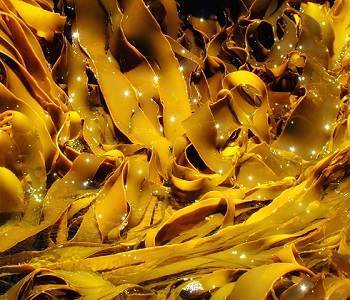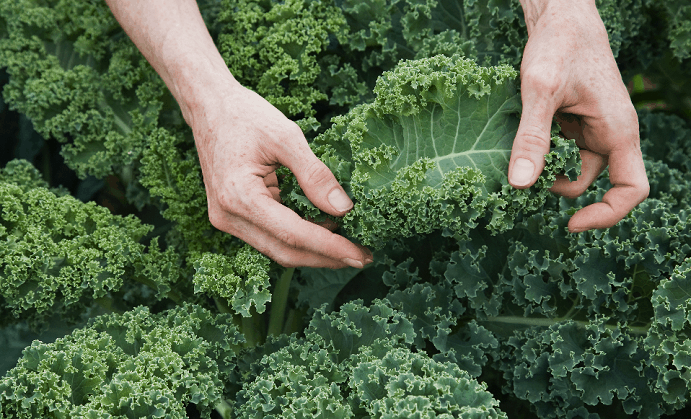One in 10 women have been diagnosed with thyroid problems. Some endocrinologists believe that one in four women have an underactive or overactive thyroid. One reason may be because our thyroid glands are twice as large as those in men, creating a greater need for iodine. When we’re under stress, our thyroids become even larger and more active, causing us to need even more. This recent epidemic of thyroid problems appears to be due to a decline in dietary iodine. The single most important element provided by seaweeds, is Iodine. It is more abundant in seaweeds, any seaweed, than any plants or animals. Land plants, vascular plants in particular, seem to have no detectable iodine requirement. Iodine is used in thyroid hormones, T4, thyroxine, and T3, tri-iodothyronine to control all fetal development, postnatal growth, and ongoing daily body metabolism. Therefore no iodine, no vertebrate life. The choice of iodine seems to have been its isoptopic stability: there is only one known natural iodine isotope, iodine 127. It is reliable, not subject to radioactive decay. When vertebrates lived in the sea, even at about 60ppb, there was a constant reliable source of iodine. Since some vertebrates left the sea, obtaining enough iodine has been a challenge to their descendants, including ourselves.
 Brown seaweeds – higher in iodine – include all kelps, Fucus (said to be the best for underactive thyroids), Hijiki, and Sargassum. Red seaweeds include dulse, nori, Irish moss, and Gracillaria. Nori, used to make sushi, is easy to find in all Oriental markets and many health food stores. Some is toasted and packaged in small packets. It’s delicious, but not particularly high in iodine. Most forms of kelp have 500-1500 ppm (parts per million) of iodine; nori has 15 ppm. Toasting doesn’t affect seaweed’s iodine content, so eat it in whatever form you like best, but don’t depend only on nori to boost your iodine levels.
Brown seaweeds – higher in iodine – include all kelps, Fucus (said to be the best for underactive thyroids), Hijiki, and Sargassum. Red seaweeds include dulse, nori, Irish moss, and Gracillaria. Nori, used to make sushi, is easy to find in all Oriental markets and many health food stores. Some is toasted and packaged in small packets. It’s delicious, but not particularly high in iodine. Most forms of kelp have 500-1500 ppm (parts per million) of iodine; nori has 15 ppm. Toasting doesn’t affect seaweed’s iodine content, so eat it in whatever form you like best, but don’t depend only on nori to boost your iodine levels.
You can add powdered seaweed to your food; toast small pieces of seaweed for a tasty snack; or add larger pieces of a variety of seaweed to soups, grains, or vegetables.
Some individuals are extremely sensitive to iodine. A little bit too much in their diets and they begin to exhibit hyperthyroid signs and symptoms: nervousness, heart palpitations, sleeplessness, irritability and even iodine-induced goiter. If these symptoms appear, first inquire about seaweed/iodine consumption(from any source, including dairy and baked goods). Individuals with “seafood allergy” seem especially sensitive to iodine.
 It’s also worth remembering that if the water the seaweed comes from is contaminated (with, say, toxic metals or arsenic), the seaweed will be as well. The US Food and Drug Administration regulates commercial seaweed, and they have pretty high safety standards, but it’s important to note that the FDA does not regulate supplements.
It’s also worth remembering that if the water the seaweed comes from is contaminated (with, say, toxic metals or arsenic), the seaweed will be as well. The US Food and Drug Administration regulates commercial seaweed, and they have pretty high safety standards, but it’s important to note that the FDA does not regulate supplements.
So if you’re taking seaweed pills , it’s important to choose a reputable brand. Speak with your physician before you decide on supplements — the metals in some seaweed pills could send you to the hospital, and they can be especially to dangerous to pregnant or lactating women and their babies.
With the right accompaniments, seaweed can be a flavorful component with a healthy dose of antioxidants and iodine.
Do you want to find an effective Thyroid treatment? Check out our top rated Thyroid products










